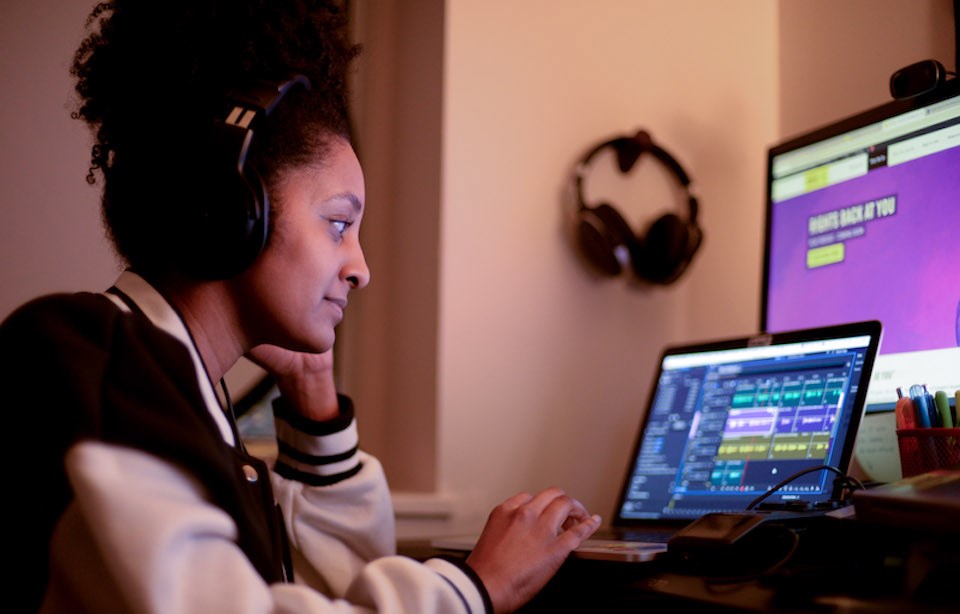As Black History month gets underway, a new podcast sheds light on a variety of topics, including anti-Black racism, surveillance, and policing in the post-2020 era.
As a human rights topic, surveillance disproportionally targets Black people in several ways, including facial recognition technology, street checks, and larger government programs -- just to name a few.
Daniella Barreto, podcast host and producer of Rights Back at You, tells V.I.A. she faced targeted mass surveillance when she participated in a Black Lives Matter Vancouver vigil in 2017 for Alton Sterling and Philando Castile. The two Black men were fatally shot by police in separate, high-profile incidents in Texas.
The peaceful vigil was held during the day outside of the Vancouver Art Gallery. However, VICE News obtained a cache of intelligence reports through Canada’s Access to Information Act that showed the Royal Canadian Mounted Police was monitoring the social media accounts of Black Lives Matter Vancouver. This included the organization's Twitter, Facebook, and Instagram accounts.
Barreto wasn't aware of the surveillance until months after the vigil took place and says she was disturbed that police monitored the group's activity despite there being no risk to public safety.
"It was an alarming realization to come to. It was that experience that kind of inspired this podcast series...that this happens actually quite a lot to Black organizers, Black activities, and Indigenous people...that their activities are monitored," she explains.
"When we layer technology and the system that already exists, it can make it quite dangerous to protest for human rights."
But mass surveillance isn't the only way that marginalized groups are disproportionately targeted across the country.
Black History month discussion includes drug criminalization
In the podcast's second episode, harm-reduction activist Hugh Lampkin discusses how drug criminalization impacts Black people in Canada, referencing his own experience as a drug user on Vancouver's Downtown Eastside and the struggle he faced to bring a life-saving medication to people who use drugs.
Lampkin had to smuggle naloxone -- a fast-acting drug that reverses or temporarily reverses an opioid overdose -- out of a "research conference to make life-saving overdose reversal medication available on the street," Barreto noted.
The DTES activist has a long history of helping people in need, which is something he says he was raised to do.
"In Toronto, in the winter time I used to drive around and look for people," Lampkin says on the podcast, noting that he'd give people experiencing homelessness things like coffee and blankets, as well as speak with them to determine what other help they might need, such as locating a shelter.
"Growing up being Black we've always had to do something for the community. I grew up with that mindset."
In her book Policing Black Lives, Robyn Maynard discusses how drug criminalization began in the 1980s as a tool of oppression that "created a vilifying link between drugs, danger, and Black communities, fanning the flames of moral panic," Barreto explains.
Black people have also been disproportionately arrested for possession of illegal substances due to carding -- an intelligence-gathering policy that involves the stopping and documenting of people when no crime is being committed.
"Police pay more attention to Black people's movements in public space," she says.
While there may be fewer Black people living in Vancouver than there are in Toronto or in big cities south of the border, Barreto says that doesn't change the impact of discrimination they face, noting that these impacts are often minimized.
Available to stream on all the major podcast platforms, the first two episodes launched Wednesday, Feb.1 and a new episode will be released every Wednesday until the end of February.
Rights Back at You is the product of an all-women creative team featuring Barreto, Serisha Iyar (producer), and Vocal Fry Studios’ Katie Jensen (story-editing, sound design, and post-production).




